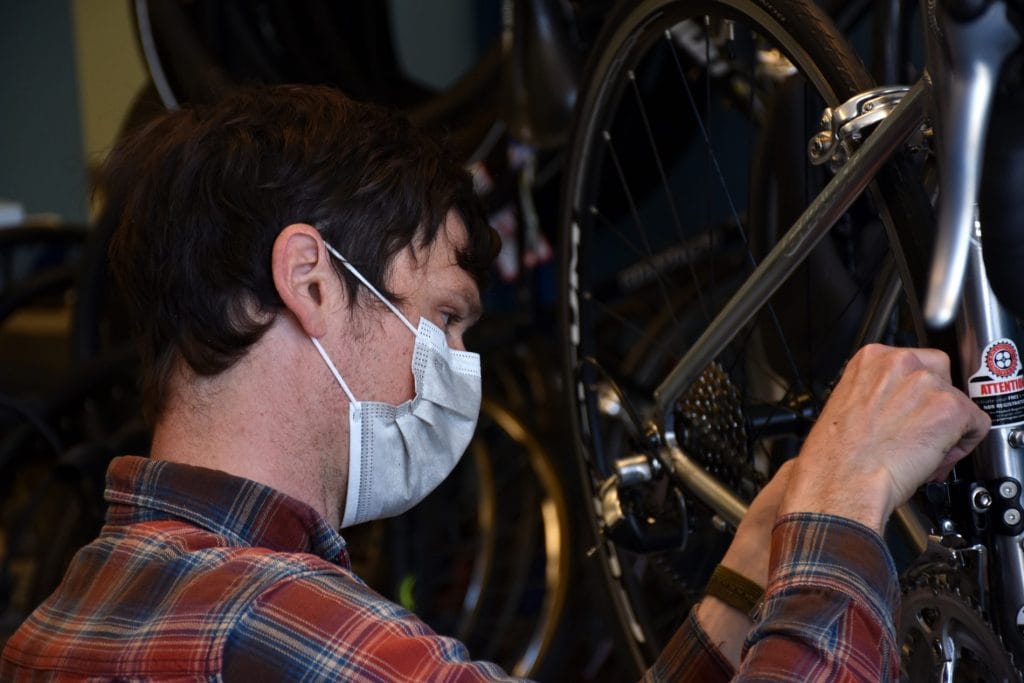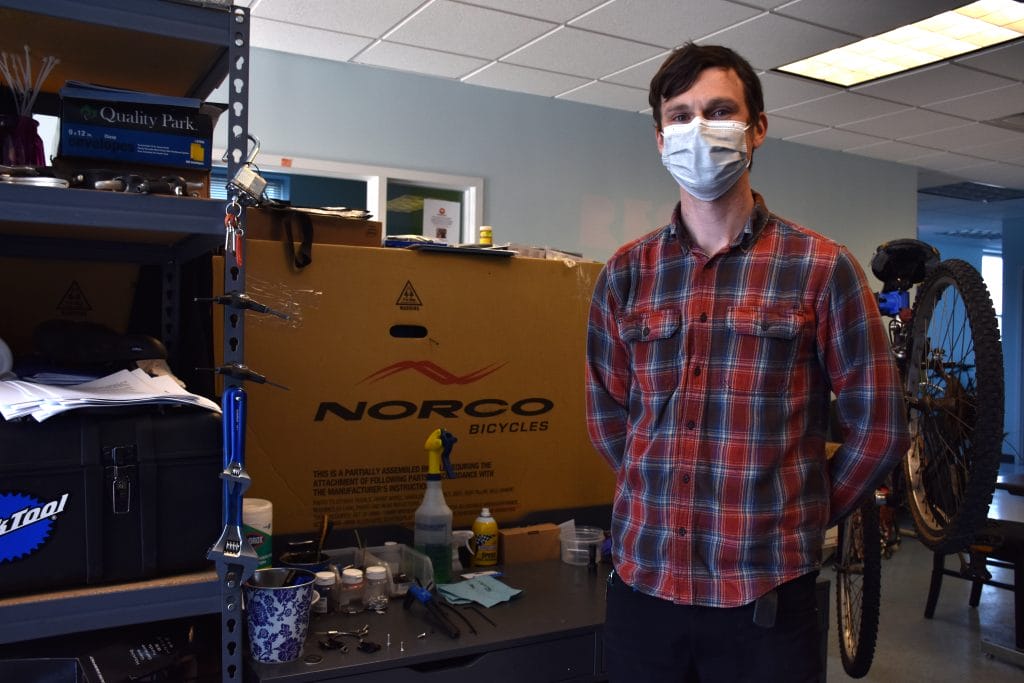Richmond program helps formerly incarcerated individuals through transportation access

Ride 2 Reentry program coordinator Kyler O’Brien fixes up donated bikes for formerly incarcerated people. Photo by Lily Doshi
For more than 250 formerly incarcerated people, attending weekly bike classes with the Opportunity Alliance and Reentry Richmond Inc. represents a second chance at life.
“I think that’s really important,” said Alex Slipow, coordinator of community engagement and volunteer services at OARRIC. “The bike is a representation of this second chance and reclaiming that, and whether it’s getting to employment or just going out and being a human and having access to things.”
The Ride 2 Reentry program provides bicycles, helmets and weekly maintenance lessons to mitigate the transportation barriers often faced by formerly incarcerated people, Slipow said. The program aims to increase access to employment and social outings among its participants.
Ride 2 Reentry initially began in 2016, but Slipow said bike donations and community engagement have increased following nationwide Black Lives Matter protests over the past summer. She said it’s been interesting to see the program expand and interact with different groups of people than before, such as the Richmond cycling community.
“Following the murder of George Floyd, everyone’s been looking to engage in criminal justice reform in various ways,” Slipow said. “So people have been finding us and learning about Ride 2 Reentry.”
Ride 2 Reentry is open to those who have been released from jail or prison within the past year. The participant’s bike, which is often their first possession following incarceration, helps reduce Richmond’s recidivism rate, or criminal re-offense, Slipow said.
Slipow said the OARRIC conducted a study in 2018 on the effectiveness of the program and its impact on its clients. The study showed a direct correlation between possession of a bicycle and an increase in access to social and recreational activities, according to Slipow.
Virginia currently has the lowest recidivism rate in the country at 23.1%, according to a 2020 press release from the Virginia Department of Corrections. This has been attributed to evidence-based reentry programs and services by the VADOC.
“In measuring recidivism, there’s risk factors that are involved and one of the risk factors is antisocial behavior,” Slipow said. “So that was a pretty cool outcome to see that there was a direct link to how recidivism is defined.”
Slipow said the program’s operations are supported almost exclusively by community donations, which can be made on the organization’s website. Used bicycles and equipment can be donated at the organization’s headquarters, or Ride 2 Reentry program coordinator Kyler O’Brien can pick them up from the donor.
“The program tries to address one of the difficulties of just being an everyday person, which is transportation,” O’Brien said. “A lot of times, it’s an expired license, or not having a car or being incarcerated while your car is parked on the wrong side of the street and it gets towed. It tries to address some of these concerns.”

The amount of people serviced by the program is determined by how many bikes and supplies O’Brien is able to distribute per week, he said.
“We have a mixture of new bikes and used bikes that come into the program,” O’Brien said. “I then tune them up, fix them, basically bring them back up to a safe riding standard. And then we hold class, which is the best part of it.”
The weekly classes, where O’Brien teaches up to three clients in accordance with COVID-19 social distancing guidelines, begin with traffic laws and lessons on how to safely navigate Richmond’s streets as a cyclist. After these classes, O’Brien teaches the participants basic bicycle maintenance, which he said is crucial to the success of the program.
“We want our participants to be self-sufficient,” O’Brien said. “If that means using their bike to get to work, we want them to show up on time and keep that job. If that means learning how to change a flat tire on the side of the road, we want them to have that knowledge.”
Braden Govoni, owner of Outpost Richmond, a small grocery and bicycle store that has partnered with the program to provide cycling equipment and repairs, said that the program allows for Richmond residents to easily give back to the community.
“People are always pretty excited to be donating towards that particular cause,” Govoni said. “I think it’s something that just resonates well with a lot of people in our customer base that would rather donate it than just like sell it on Craigslist or give it away.”
Having access to reliable transportation is an important aspect of the program, especially when it comes to getting to and from work in the city, Govoni said.
“Richmond’s public transportation system isn’t always the best it can be, and it can be limiting as far as where it can potentially take people to where their job may be,” Govoni said. “Having a bicycle to use solely for transportation or in conjunction with access to public transportation has been a huge thing for so many people who have come to the program.”



